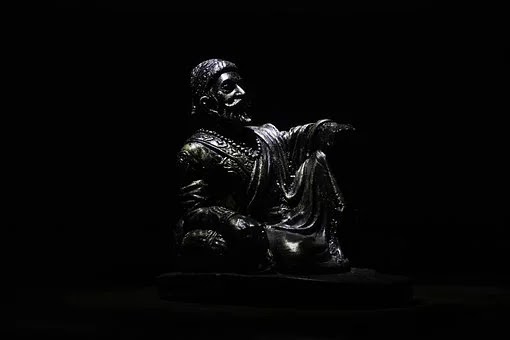Doctor Faustus by Christopher Marlowe
(Summary & Analysis)
Let's review the plot of Dr. Faustus. Dr. Faustus is a drama written by Christopher Marlowe. The play is composed of acts that include chorus interludes and scenes comprised of action.
 |
| Doctor Faustus by Christopher Marlowe - readonlinetoday.com |
Image Source - wikipedia
Introduction -
In act 1, Dr. John Faustus is introduced by the chorus in the introduction. The chorus explains that his story is not a tale of warfare or love but of a budding intellectual who has to choose traditional areas of study to explore necromancy or black magic for fame and fortune. During the rising action, Faustus sits in his study looking over various texts in traditional subjects rejecting them until he turns at last to a book of magic. In spite of warnings from the good angel that appears arguing with an evil one attempted Faustus settles on learning it. Later in a demonstration of his conjuring skills, Faustus summons up the devil Mephistopheles who serves a more powerful master. Lucifer, the Prince of Devil's, Mephistopheles warns that by dabbling in magic Faustus risks corruption of his soul and the torments of damnation. Faustus sends the devil back to his master with an offer. The soul of Faustus in exchange for 24 years of service from Mephistopheles.
In act 2, Mephistopheles returns to Faustus and tells him, Lucifer has agreed to the deal provided Faustus will write and sign the agreements for his soul in blood. Mephistopheles showers him with rich gifts and devilish entertainment and then provides all the books Faustus desires on spells and incantations. Faustus signs.
In act 3, Faustus uses his dark powers to travel to Rome, where, he visits the Pope, harassing and abusing him and his inner circle with his metaphysical pranks.
In act 4, Faustus travels throughout Europe appearing at the courts of Kings and earning an impressive reputation for wit and knowledge of the Black Arts like a true entertainer. Faustus conjures up Alexander the Great for the emperor of careless the fifth but when a knight mocks the Doctor's skill petty vengeful Faustus gives him a pair of horns on his head. Later he entertains a Duke and Duchess producing grapes in the winter. Wow, really worth selling your soul over for sure.
In act 5, the final act, the 24 years allotted to the doom, Doctor, are winding down and soon it will be time to forfeit his soul. An old man appears and begs him to repent and asks God's forgiveness. Though briefly tempted Faustus reaffirms his vow to Lucifer and blood. Panicking Faustus begs Lucifer to spare him or for the earth to bury him and hide him from the wrath of God. But Faustus's destiny is fixed. The clock strikes 12:00 and in the play's climax. Lucifer's minions appear and drag the Doctors soul off to hell.
During the falling action the chorus confirms Faustus's soul is damned and lost forever. In the resolution of the play, the chorus makes clear the whole play is a cautionary tale of forbidden knowledge and damnation.
Characters –
Let's review the characters in Doctor Faustus.
Doctor Faustus –
The first is the titular main character, Dr. Faustus. A brilliant theologian from the University in Vinton burg Germany, Dr. Faustus mastered the subjects of logic and medicine. He's a smart ambitious inquisitive man of the Renaissance. Driven to seek knowledge and the wisdom of the world. But his Restless often impatient intellect leads him to the acquisition of dark magic and the unlimited power and knowledge it promises. Disregarding God's Authority he arrogantly imagines all the great and noble things, he will accomplish with his powers including being emperor of the world. But Faustus's grand visions never materialized. He lacks the moral strength to use magic wisely or for good and his lowest most petty impulses take center stage. He becomes wealthy and famous for performing mediocre tricks and abusing others. He turns his back on God labels hell affable and refuses every chance to repent and save his soul.
 |
| Doctor Faustus by Christopher Marlowe - readonlinetoday.com |
Image Source - wikipedia
Mephistopheles –
Mephistopheles is another important character. The devil Mephistopheles describes himself as one of the unhappy spirits that fell with Lucifer when God threw that former angel out of heaven. Representing his master Lucifer Mephistopheles facilitates Faustus's damnation. He recruits Faustus oversees his blood pact with Lucifer and make sure the Doctor remains loyal to hell for the next 24 years. Mephistopheles presents a surprising portrait of the Damned that is both villainous and tormented. He deceives manipulates and threatens Faustus when the Doctor leans toward repentance. Yet, Mephistopheles can be truthful and is capable of suffering eternally damned himself as Lucifer's agent. While he inflicts fiendish pain on the damned, he also reveals his own agony. He has seen the face of God and tasted eternal bliss and is therefore tormented with ten thousand hells himself. Early on he even tries to persuade Faustus not to sell the soul and to turn back from this path to damnation.
Lucifer –
Lucifer is another key character. The cunning and cruel manifestation of eternal damnation. Mephistopheles introduces Lucifer to Faustus as his master, the Prince of Devil's. Once an angel, Lucifer was not content to serve God but wish to take his place. The Throne from heaven his kingdom now is hell, and he works against God corrupting humans luring them into sin and capturing their immortal souls to populate his realm for eternity. The soul of intellectual theologian Faustus is a prestigious catch and Lucifer is more than willing to make a pact to ensnare it. Lucifer is a clever and merciless devil who wields fear as a tool to get what he wants.
Symbols –
There are a few major symbols in Doctor Faustus.
The first is books — Books scattered throughout the play represent various avenues of learning as well as Faustus's attitude toward the knowledge and wisdom each offers. Act one sees Faustus perusing books representing traditional subjects of study during the Renaissance, logic, medicine, law and theology. Books represent the accumulated knowledge and wisdom of the medieval past when he tosses the books aside, Faustus symbolically rejects their subject and dismisses their value. Then picks up a book on necromancy a branch of magic in which someone make the dead appear in the form of spirits to manipulate the present or predict the future. This symbolic promise of hidden forbidden knowledge appeals to Faustus. Once he signs his pact with Lucifer Mephistopheles gives him an even better book filled with spells and incantations as well as the secrets of astronomy, astrology, and the Natural Sciences. In his final act of despair, Faustus vows to burn his books signaling that he means to give up necromancy. The wish to burn the books symbolizes rejecting magic in favour of salvation and really choosing helpful and constructive wisdom growth and knowledge over frivolous abuses of earthly power.
Angels are another key symbol. Faustus is good and evil angels personify the conflict between the opposing values of the spiritual battle taking place for Faustus's heart and eternal soul. The angels also symbolize Faustus's inner turmoil as he wrestles with his pride and ambition on the one hand, and his conscience and fear of damnation on the other. The two angels symbolized the dividedness of human nature the internal tug-of-war between a human's noble and moral aspirations and the same humans ignorant and immoral passions. The angel the old man at the end promises is hovering above Faustus is a reminder that salvation is always an option.
Another major symbol is blood is a symbol of life and life's connection to God meth estoppel ease insists that the deed to Faustus his soul is to be drawn up in the Doctor's blood underscoring the bloods supernatural nature. Blood secures the link between Faustus and Lucifer. As the Doctor literally hands over his soul to the devil. This causes fast as his soul to be bound to Hell. Yet while blood the source of life still courses through Faustus's veins he lives and has the chance to repent. At the play's end, the old man pleads with Faustus to shed one drop of blood to mingle with tears of repentance to save his soul. Faustus wishes he could gush forth blood instead of tears. As his death draws near, he sees where Christ's bloodstreams in the firmament. An allusion to blood Jesus Christ shed on the cross. Faustus is not yet beyond repentance or blood oath to God.
Themes -
Let's review the central themes in Doctor Faustus. First is knowledge over wisdom. knowledge is all about the accumulation of facts information and skills through education and experience. But wisdom comes from the useful synthesis and unpacking of facts information and skills into a deeper and more truthful understanding of life and relationships. Dr. Faustus thirsts for knowledge yet in his fervent pursuit of it. He impatiently rejects many lines of scholarship. His quest leads to his downfall primarily because Faustus has not acquired and doesn't really care about wisdom. As Faustus proves as he practices the forbidden art of necromancy. Knowledge without the moral guidance of wisdom can be used for good or evil. His desire to push the boundaries of human knowledge lacks stabilizing guiding wisdom and that sets the stage for evil.
Another major theme is that of pride and ambition. Pride and arrogance make Faustus impatient with traditional study. His ambition to learn without limits turns him toward magic and he fantasizes that by mastering this field of study he could become a God and command a vast realm. Faustus's pride is a sin that leads straight to fiery eternal damnation. Damnation versus salvation is another key theme. Damnation is eternal separation from God. Salvation is mercy from God to one who repents and asks forgiveness. For his sins if Faustus repents salvation is still possible. Otherwise, damnation is inevitable. When the good angel and old man remind Faustus he can be saved, Faustus is forced to question his own character and motivations as he tries to decide between damnation or salvation via showing proper repentance to God which challenges his egotistical sense of entitlement. Faustus chooses damnation.
Destiny versus free will is yet another major theme. Faustus appears unable to repent even in moments of great despair. Playwright Christopher Marlowe uses Faustus's apparent helplessness to explore the idea of predestination posed by French-born Protestant theologian, John Calvin. Calvin reasoned that God being omniscient knows from the outset who will be saved and who will not? Therefore human action and choice are not the keys to salvation. Since that end is predetermined. Is Faustus helplessly driven by destiny or doomed by his own poorly exercised free will? It wouldn't be Dr. Faustus without the theme of good versus evil. Faustus himself embodies the concepts of good and evil as a theologian he represents the good or spiritually uplifting study of divinity. However, he abandons theology to pursue forbidden knowledge falling prey to sin. Mentally and spiritually torn by desire and fear, Faustus his struggle is embodied by the good and evil angels. The two angels act as counselors offering advice warnings and arguments intended to persuade the Doctor toward. That's right good or evil.







0 Comments